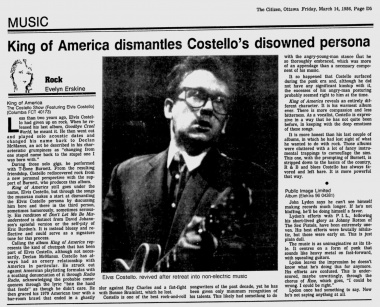Ottawa Citizen, March 14, 1986: Difference between revisions
(start page) |
(formatting) |
||
| (8 intermediate revisions by 2 users not shown) | |||
| Line 2: | Line 2: | ||
{{:Bibliography index}} | {{:Bibliography index}} | ||
{{:Ottawa Citizen index}} | {{:Ottawa Citizen index}} | ||
{{: | {{:Canada publications index}} | ||
{{Bibliography article header}} | {{Bibliography article header}} | ||
<center><h3> | <center><h3> King of America dismantles Costello's disowned{{nb}}persona </h3></center> | ||
---- | ---- | ||
<center> Evelyn Erskine </center> | <center> Evelyn Erskine </center> | ||
---- | ---- | ||
''' The Costello Show (Featuring Elvis Costello) <br> | |||
King Of America | |||
{{Bibliography text}} | {{Bibliography text}} | ||
Less than two years ago, Elvis Costello had given up rock. When he released his last album, ''Goodbye Cruel World'', he meant it. He then went out and played solo acoustic dates and changed his name back to Declan MacManus, an act he described in his characteristic grumpiness as "changing from one stupid name back to the stupid one I was born with." | |||
During those solo gigs, he performed with T Bone Burnett. From the resulting friendship, Costello rediscovered rock from a new personal perspective with the support of Burnett, who produces this album. | |||
''King of America'' still goes under the name Elvis Costello, but through the songs the musician makes a start at dismantling the Elvis Costello persona by discussing him here and there in the third person, sometimes humorously, sometimes seriously. His rendition of "Don't Let Me Be Misunderstood" is distinct from David Johansen's spiteful version or the self-pity of Eric Burdon's. It is instead bluesy and reflective and could serve as a signature tune for this process. | |||
Calling this album ''King of America'' represents the kind of chutzpah that has been part of Elvis Costello, although not necessarily Declan MacManus. Costello has always had an ornery relationship with America in particular. He struck out against American playlisting formulas with a scathing denunciation of it through "Radio, Radio," acknowledging the probable consequences through the lyric ''"bite the hand that feeds"'' as though he didn't care. He then graced his 1979 American tour with a bar-room brawl that ended in a ghastly slur against Ray Charles and a fist-fight with Bonnie Bramlett, which he lost. | |||
Costello is one of the best rock 'n' roll songwriters of the past decade, yet he has been given only minimum recognition of his talents. This likely had something to do with the angry-young-man stance that he has so thoroughly embraced, which was more of an appendage than a necessary component of his music. | |||
It so happened that Costello surfaced during the punk era and, although he did not have any significant kinship with it, the excesses of his angry-man posturing probably seemed right to him at the time. | |||
''King of America'' reveals an entirely different character. It is his warmest album ever. There is more compassion and less bitterness. As a vocalist, Costello is expressive in a way that he has not quite been before, in keeping with the deep emotions of these songs. | |||
It is more honest than his last couple of albums, in which he had lost sight of what he wanted to do with rock. Those albums were cluttered with a lot of fancy instrumental trappings to camouflage the sins. This one, with the prompting of Burnett, is stripped down to the basics of the country R & B and blues Costello has always favoured and left bare. It is more powerful that way. | |||
{{cx}} | |||
{{tags}}[[King Of America]] {{-}} [[T Bone Burnett]] {{-}} [[Declan MacManus]] {{-}} [[Don't Let Me Be Misunderstood]] {{-}} [[David Johansen]] {{-}} [[Goodbye Cruel World]] {{-}} [[Radio, Radio]] {{-}} [[Ray Charles]] {{-}} [[Bonnie Bramlett]] | |||
{{cx}} | {{cx}} | ||
| Line 23: | Line 41: | ||
{{Bibliography images}} | {{Bibliography images}} | ||
[[image:1986-03-14 Ottawa Citizen clipping 01.jpg| | [[image:1986-03-14 Ottawa Citizen clipping 01.jpg|380px|border]] | ||
<br><small>Clipping.</small> | <br><small>Clipping.</small> | ||
| Line 33: | Line 51: | ||
*[http://www.ottawacitizen.com OttawaCitizen.com] | *[http://www.ottawacitizen.com OttawaCitizen.com] | ||
*[http://en.wikipedia.org/wiki/Ottawa_Citizen Wikipedia: Ottawa Citizen] | *[http://en.wikipedia.org/wiki/Ottawa_Citizen Wikipedia: Ottawa Citizen] | ||
<!-- 464683621 --> | |||
{{DEFAULTSORT:Ottawa Citizen 1986-03-14}} | {{DEFAULTSORT:Ottawa Citizen 1986-03-14}} | ||
Latest revision as of 04:04, 10 March 2021
|
